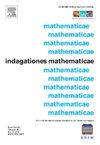Restriction theorems and root systems for symmetric superspaces
IF 0.5
4区 数学
Q3 MATHEMATICS
引用次数: 0
Abstract
In this paper we consider those involutions of a finite-dimensional Kac–Moody Lie superalgebra , with associated decomposition , for which a Cartan subspace in is self-centralizing in . For such the restriction map from to is injective on the algebra of -invariant polynomials on . There are five infinite families and five exceptional cases of such involutions, and for each case we explicitly determine the structure of by giving a complete set of generators for the image of . We also determine precisely when the restriction map from to is surjective. Finally we introduce the notion of a generalized restricted root system, and show that in the present setting the -roots always form such a system.
对称超空间的约束定理和根系统
本文研究了有限维Kac-Moody Lie超代数g的对合θ,并给出了相应的分解g=k⊕p,其中p0中的Cartan子空间a在p中自集中。对于这样的对合θ,从p到a的限制映射Cθ在p上的k不变多项式的代数p (p)k上是内射的。这类对合有5个无限族和5个例外情况。对于每种情况,我们通过给出Cθ像的一组完整的生成器来明确地确定P(P)k的结构。我们还精确地确定了从P(g)g到P(P)k的限制映射Rθ是满射的情况。最后,我们引入了广义受限根的概念,并证明了在目前的情况下,a根Δ(a,g)总是形成这样一个系统。
本文章由计算机程序翻译,如有差异,请以英文原文为准。
求助全文
约1分钟内获得全文
求助全文
来源期刊
CiteScore
1.20
自引率
16.70%
发文量
74
审稿时长
79 days
期刊介绍:
Indagationes Mathematicae is a peer-reviewed international journal for the Mathematical Sciences of the Royal Dutch Mathematical Society. The journal aims at the publication of original mathematical research papers of high quality and of interest to a large segment of the mathematics community. The journal also welcomes the submission of review papers of high quality.

 求助内容:
求助内容: 应助结果提醒方式:
应助结果提醒方式:


